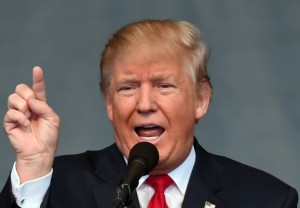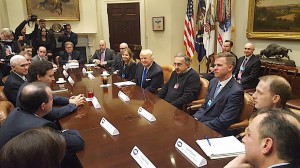
President Trump's proposed tax on goods coming into the U.S., particularly cars and trucks, may get squashed by Congressional Republicans.
Republican Senators are growing increasingly cool to the idea of imposing a “border tax” on goods, including cars and trucks, exported to the U.S. from other countries in the Americas, Europe and Asia.
According to The Hill, a Capitol Hill newsletter and website, House Speaker Paul Ryan has met with Republican senators to neutralize the growing opposition to a core element of a tax plan cobbled together by Republicans in the U.S. House of Representatives who hope to advance President Donald Trump’s agenda.
A 20% across-the-board tax on imports, also known as border adjustment, has become part of Trump’s plans to push companies to do more manufacturing in the U.S. Trump has threatened various auto makers, including General Motors, Ford Motor Co. and Toyota, with the border tax because they now build vehicles in Mexico.
The American International Automobile Dealers Association, which is one of the groups leading the fight against the border tax, warned the proposed levy would lead to higher car prices and reduce the number of Americans purchasing new vehicles.
A new number estimates could raise the prices by $1,312 for American Honda, $1,672 for Fiat Chrysler Automobiles, $2,298 for Nissan North America and $2,651 for Toyota. Automakers that import their full line-ups would, logically, be even more affected, including $5,156 per vehicle for Mazda Motor and $17,204 for Tata Motors’ Jaguar and Land Rover brands.
Ryan beseeched the senators to “keep your powder dry” while House tax writers hammer out the details of their plan and prepare to move it to a vote later this year, according to a GOP source familiar with the meeting.
(Talks to renegotiate NAFTA likely to start in May. Click Here for the story.)
But various companies, including Toyota, have pushed back hard against the proposal of a border tax, lobbying Congress, particularly Republicans, to block the imposition of taxes or tariffs on goods made abroad and exported to the U.S. In addition, American farmers, who are dependent on exports to other countries, also have raised alarms about the border tax.
In the wake of the lobbying effort, Senate Republicans say political momentum has begun to shift against the House’s border adjustment tax in recent days.

President Donald Trump, center, met with the CEOs of Ford, General Motors and Fiat Chrysler to discuss jobs and other issues relevant to the companies.
Sen. Tim Scott (R-S.C.), who represents a state heavily dependent on investment from foreign corporations, such as BMW, Mercedes-Benz and Volvo, said of the border tax proposal: It’s “going to be very difficult to get it through the Senate.”
“I think it’s tough,” said Scott, a member of the Senate Finance Committee, which has jurisdiction over tax issues. “The longer it takes to explain, the harder it is to implement,” Scott told The Hill.
A “20% negative impact when [products come into the country] means those who bear the burden the most are the consumers in the country,” Scott said.
(Automakers look for options, weight costs under Trump. Click Here for the story.)
The State of Texas, which has voted Republican in recent presidential elections, also has emerged as a center of opposition to the border tax as well as Trump’s plans to make major alternations in the North American Free Trade Agreement, or NAFTA. More that 700,000 jobs in Texas now depend directly or indirectly on trade with Mexico, which would be disrupted by a border tax, according to The Wall Street Journal.
Various companies opposed to the border tax say it would make their products more expensive and have mounted a lobbying campaign against it in recent weeks. The CEOs of several major retailers that oppose the proposal will be meeting with lawmakers Wednesday on Capitol Hill.
Sen. David Perdue (R-Ga.), the former CEO of Reebok and Dollar General, is one of the Republicans leading the effort in the Senate to kill the import tax. “I’m talking with everybody that will listen to me about the border adjustment tax because I think it’s a bad idea,” Perdue told The Hill
CEOs from several major retailers in the coalition allied with Perdue are meeting with lawmakers Wednesday, including Target, Best Buy, The Gap and JCPenney.
Ryan has argued that keeping the border adjustment tax would be helpful to getting tax reform passed through both chambers, because it would raise $1.2 trillion in revenue and allow the overall plan to be scored as deficit-neutral, according to two lawmakers who attended the meeting.
(Trump threatens Canada, Mexico, with new border tariffs. Click Here for the story.)
By not adding to the deficit, Ryan argued, the reform package would be more likely to attract the support of fiscal conservatives in both chambers.

It’s common knowledge that anything you buy made in the U.S. costs more. Period.
What’s wrong with a border tax to level the playing field?
Actually, even if it is “common knowledge,” that isn’t accurate, Larry. American factory productivity has risen dramatically and, in some arenas actually is well ahead of overseas competitors. Add the fact that increasing automation levels have reduced labor cost penalties on many, many products. (Labor on the auto assembly line, for example, is now typically below 10% of the final goods’ cost, a relatively insignificant figure on higher-end products, which is why BMW, for example, can export two-thirds of the vehicles produced in Spartanburg, SC. Add the shipping and logistics issue and you have even more of a cost advantage. Lear, for example, was already beginning to insource some production well before the Nov. election because it was able to so highly automate some of its operations that labor didn’t matter but shipping did, and it is now cheaper to produce some goods in the States.
The irony is that the most likely items to return to the U.S. will be precisely those goods that can be automated to the Nth. So, they will come back, but there will be virtually no one on the factory floor. Robots — not Mexicans or Chinese — will still replace American workers.
Paul A. Eisenstein
Publisher, TheDetroitBureau.com
Really? REALLY? No one could see this happening when Trump was campaigning on this issue?